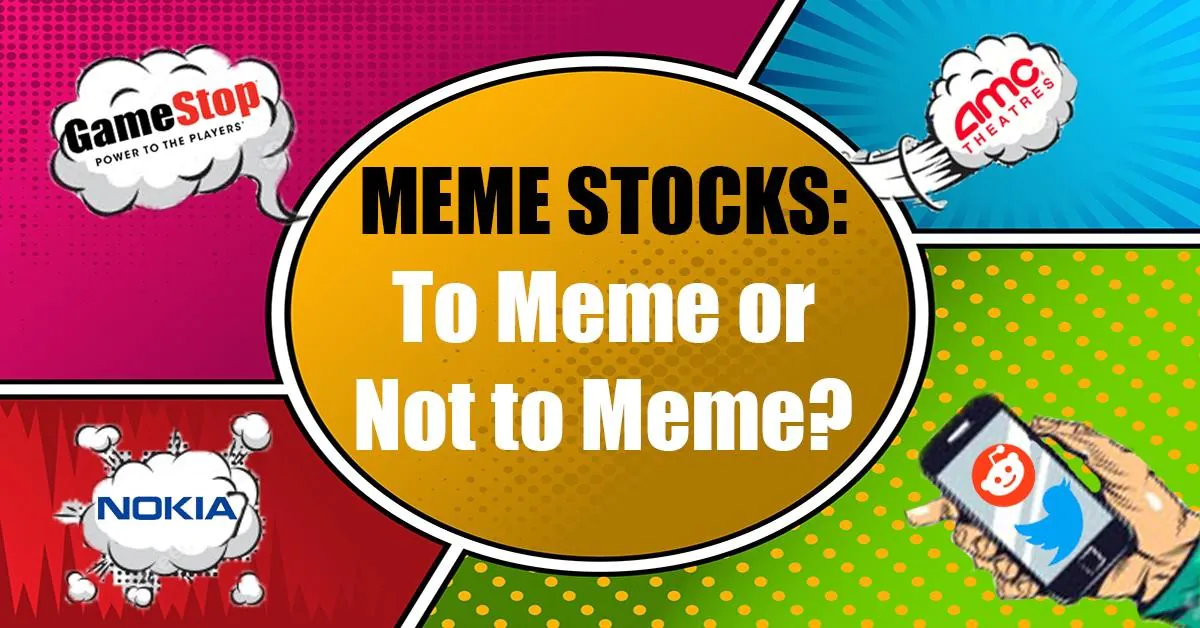Meme Stocks: To Meme or Not To Meme?

Athena Miao, Dealer
Athena graduated from the National University of Singapore with a Bachelor’s Degree in Economics. She is an ex-MOE teacher who decided to pursue her passion in finance and economics after years of service. Combining her working experience in UOB as a banker and current position as a dealer managing over 50,000 accounts in Phillip Securities, she firmly believes in making informed decisions to ride the tides of the market. In her free time, she enjoys reading The Economist to review the latest global outlook.
At a glance:
- Meme stocks have been known to produce overnight millionaires out of mom-and-pop investors.
- Meme investing, however, is extremely short-term and volatile, defying fundamental and technical analysis.
- While their rise is fast and steep, their decline can be just as sharp and swift.
What are Meme Stocks?
GameStop’s short squeeze in January 2021 famously led to the birth of a whole new breed of stocks: meme stocks.
According to Wikipedia, meme is “an idea, behaviour or style that spreads by means of imitation from person to person within a culture and often carries symbolic meaning representing a particular phenomenon or theme.”[1]
How does that translate to stocks?
Meme stocks are stocks that have gone viral, creating a lot of buzz which attracts more and more retail investors into piling onto the bandwagon.
Their trading volume and share prices surge not because of anything the underlying companies do but because of the hype generated on social media like Twitter, Reddit and Tik Tok.
Their share prices often shoot through the roof but fall back to earth in a short span of time.
Because meme stocks are based on hype, they defy all fundamental and technical analysis. Due to their extreme unpredictability and volatility, they are shares at the very far end of the risk spectrum.
This high risk does not dampen their popularity. Meme stocks are still among the top US stocks traded on POEMS in the last few months.
Let us try to understand this baffling phenomenon.
David vs Goliath: Reddit vs Wall Street
Meme stocks were ushered in by the GameStop short squeeze in January 2021.
Back then, GameStop fans were riled by Wall Street hedgers’ attempt to profit from GameStop’s share-price decline by shorting its shares. An online rally on Reddit sought to prop up the price of GameStop artificially by a mass purchase of its shares in response to the opportunistic hedging. Tesla’s eccentric founder, Elon Musk, added fuel to the fire with a simple tweet – “Gamestonk!” – along with a link to the Reddit thread [5]. Its share price soon crossed the US$200 mark and continued to climb.
The price of GameStop shot up 1,500% over the course of the next two weeks. Its sudden spike caused its trading to be halted multiple times. [2]
Wall Street’s shorting was supposed to be the nail in the coffin for GameStop, whose brick-and-mortar video game stores were losing to digital competition during the pandemic. Instead, it became an opportunity for middle-class Americans to strike back at the big boys at Wall Street. [3]
Whereas retail traders could profit from rising share prices, the hedge funds which short-sell suffer, since they are betting that the share prices of the stocks will drop. When their prices start to rise, they have no choice but to cover their short positions by buying back shares to avoid loss. This mad scramble for shares is what creates a short squeeze.
From the GameStop saga, the public realised that it could democratise the stock market by communicating instantaneously with and gathering numerous small traders through social media to beat Wall Street at its own game. [4]
Relying on Reddit and Twitter, the Davids of America took on the Goliaths of Wall Street, who are used to making fat and quick profits through short-selling.
Inspired by GameStop, retail investors started placing their bets elsewhere, on AMC Entertainment, BlackBerry, Nokia and many more. And thus, meme stocks came into a class of their own.
They are now a symbol of the commonplace investor proving that together, they are a force to be reckoned with.
Social media
If we were to apply technical and fundamental analysis to meme shares, none of it would make any sense. Meme stocks can be in a dying industry, with all-time-low investor confidence. Their share prices are usually on a multi-year decline.
Fortuitously, social media has come to the rescue of such companies.
For the first time in investment history, retail investors are able to band on social media and influence stock prices, snatching power and control away from the hedge funds with much deeper pockets. Their call to arms has saved these meme stocks from complete oblivion.
Psychology of meme trading
In meme trading, when confidence among market participants is high, share prices will soar, even if market conditions or economic fundamentals are weak. [6]
As their online rallies continue on Reddit and Twitter, more and more retail investors across the globe would want a share of the pie. This has snowballing effects on sentiment, with the next investors blindly plonking down their funds as they await the next price surge. In this way, the share prices keep spiralling.
Another mentality behind meme trading is the fear of missing out or FOMO. Basically, it is not that much different from Singaporeans charging to their nearest supermarkets to hoard groceries when Covid-19 circuit breakers are announced. Human psychology is such that when we are unsure what to do, it is always easier to mimic others.
FOMO is exacerbated by early-bird investors who blog about their overnight rags-to-riches stories on social media. [7] This makes for a perfect recipe for meme stocks to be born, with social media at its core.
The following cycle explains how meme stocks work:
- Early-adopter phase:a company is identified to be undervalued by a number of retail investors, who start to place buy orders.
- Middle phase:the stock starts to gain attention from other traders, who hop onto the bandwagon. Share price rises.
- Late/FOMO phase:the stock gains viral attention on social media. Investors who are late to the game purchase the shares out of a fear of missing out on potential profits.
- Profit-taking phase:buying peaks and the early-bird traders start to take profit. This creates panic selling as investors do not want to lose money. Share price starts to fall.
- Next cycle:after crashing, the stock may trade sideways and there may little activity for a few weeks or months, until it regains the interest of buyers in a new round of frenzy.
Are meme stocks for me?
As much as meme stocks seem to be great investments, their share prices can only rise so much for so long. When they plummet, investors who buy them after their peak would be burnt! While the rise in meme stocks is fast and steep, their decline can be just as sharp and swift. They are not for the faint-hearted!
The general rule of thumb in investing is to put in only the money that you can and are willing to lose. It means that if you are going to put US$100 dollars in meme shares, you must be mentally prepared to lose that entire US$100. As technical and fundamental analysis is disabled, buying the shares is more a gamble at the poker table than an informed decision.
Meme shares have been known to generate handsome profits for the average investor who enter and exit the market at the perfect timing. There have been investors who put their entire life savings in those shares and struck rich overnight.
But there are also unlucky ones who have lost 60-80% of their savings!
The best recommendation is to look at your own risk profile and investment objectives closely to decide if this kind of short-term and extremely volatile investment is for you.
If you need further clarity, speak to your financial adviser or trading representative at PhillipCapital today.
Trade on our award-wining suite of POEMS Platform. Open a CFD Account now!
More Articles
Battle of the E-commerce Giants
Did you know that some of the biggest companies in the world today are e-commerce platforms? Read our latest article to find out more!
Cyber Security: The Next Big Thing?
Based on current economic and social trends, cyber security looks here to stay. In fact, it will play an increasingly critical role. Read our article to find out more!
A Look into Ant Group: The Rise of Fintech Giants
Did you know? Ant Group is one of the contenders for the wholesale digital banking license in Singapore. Read on our article to find out more about Ant Group!
Disclaimer
This material is provided to you for general information only and does not constitute a recommendation, an offer or solicitation to buy or sell the investment product mentioned. It does not have any regard to your specific investment objectives, financial situation or any of your particular needs. Accordingly, no warranty whatsoever is given and not liability whatsoever is accepted for any loss arising whether directly or indirectly as a result of your acting based on this information.
Investments are subject to investment risks. The risk of loss in leveraged trading can be substantial. You may sustain losses in excess of your initial funds and may be called upon to deposit additional margin funds at short notice. If the required funds are not provided within the prescribed time, your positions may be liquidated. The resulting deficits in your account are subject to penalty charges. The value of investments denominated in foreign currencies may diminish or increase due to changes in the rates of exchange. You should also be aware of the commissions and finance costs involved in trading leveraged products. This product may not be suitable for clients whose investment objective is preservation of capital and/or whose risk tolerance is low. Clients are advised to understand the nature and risks involved in margin trading.
You may wish to obtain advice from a qualified financial adviser, pursuant to a separate engagement, before making a commitment to purchase any of the investment products mentioned herein. In the event that you choose not to obtain advice from a qualified financial adviser, you should assess and consider whether the investment product is suitable for you before proceeding to invest and we do not offer any advice in this regard unless mandated to do so by way of a separate engagement. You are advised to read the trading account Terms & Conditions and Risk Disclosure Statement (available online at www.poems.com.sg) before trading in this product.
Any CFD offered is not approved or endorsed by the issuer or originator of the underlying securities and the issuer or originator is not privy to the CFD contract. This advertisement has not been reviewed by the Monetary Authority of Singapore (MAS).








